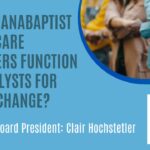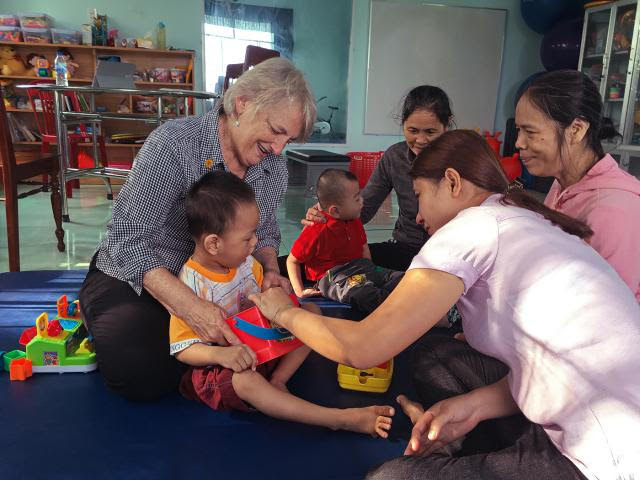This pandemic time has been unlike anything we’ve known in healthcare and in our faith-lives. Four MHF members took time to reflect on how their Anabaptist faith has supported them as they served in the Covid-19 Pandemic. We deeply appreciate their willingness to share their stories with us. If you would like to share a story of how your faith informs and upholds your practice with MHF, please e-mail cate@mennohealth.org
Faith and Resilience – Beth Miller Kraybill
Before reflecting on the impact of my faith on my resiliency, I thought I should probably revisit the definition of resilience. I must admit I was a bit taken aback. Nearly all definitions have an adverb that indicates timeliness: to recover quickly, or easily; to adjust readily. Hmm, I thought. Perhaps I’m actually not very resilient, because none of those descriptors seem to fit my journey. And then another definition came forward – capable of withstanding shock without permanent deformation or rupture. Ahh. Yes. That was more like it.
In truth, my experience of resilience is much like my faith itself. My faith tends toward slow and steady. Sometimes it buoys me forward with great energy. Other times I am full of doubt and longing. Mostly it is a constant undergirding that allows me to engage in the work I love without permanent rupture. Resilience is a similar undercurrent, an often-unrecognized stream that moves me onward.
Toward the end of 2020, I felt anything but resilient. All of my self-care and spiritual practices could not overcome my accumulated feelings of exhaustion, grief and work-related secondary trauma. Feeling embarrassed (aren’t I supposed to be able to ward this off?) and guilty (who walks away just as the pandemic is resurging?), yet also with a deep sense of knowing, I requested a six week leave of absence. I was met with tremendous care and support from my supervisor, colleagues, and co-workers. Words of affirmation and encouragement abounded, often in statements such as ‘thank you for being a good role model for taking care of oneself.’ I was able to turn the compassion I received back toward myself, and lean into time and space as necessary means of restoration.
Those six weeks helped me reconnect with core tenets of my faith. I continued to meet God in a variety of ways – weekly spiritual direction, hikes and walks in the beautiful area in which I live, and (mostly virtual) interactions with family and friends. I fed my spirit with books, jigsaw puzzles, music, and lots of sleep. I was able to participate in new support structures within my faith community. All of these helped to shore up my resilience and allowed for a slow and steady return to knowing myself as capable, compassionate, and beloved.
My faith and my resilience are integrally intertwined. I am grateful to be reminded of that truth.
Beth Miller Kraybill is a staff chaplain at Swedish Medical Center, a large urban hospital system in Seattle, WA. She is the sole spiritual care provider in a small campus with a focus on behavioral health and addiction recovery.
Finding Holy Space – Rachel Eash-Scott
One of my favorite Christmas books as a child was “Papa Panov’s Special Day,” a retelling of the Leo Tolstoy folk tale. After being told by Jesus in a dream to be on the lookout for him, a humble shoemaker spends his day watching the street and wondering when Jesus will come. As he pays attention, he notices human suffering and works to help those in need. As evening falls, he is stricken by the thought that he has missed Jesus: perhaps Jesus walked by while he was feeding the homeless man, or as he was warming the woman and child by his fire? He falls into an exhausted sleep, in which all the people he helped that day call to him, “I was Jesus. I was Jesus. I was Jesus.”
This pandemic has been exhausting. I’m a family physician working in an urban community health center; our patients are frontline workers and our COVID positivity rate hovered around 35% for most of the summer and fall. I’ve labored with COVID positive patients, wearing full PPE and sweating underneath. I’ve watched my colleagues struggle even more, especially those working in more direct care with patients with COVID. Some days, especially now in the bleak days of February, it’s hard to know how to keep going.
In these hard moments, I find myself thinking of Papa Panov. While trying to keep his eyes open for Jesus, he found himself noticing the needs of the people in front of him; he stopped his watch to care for them, and in doing so found Jesus. It’s not always easy for me to stop and pay attention in the middle of a busy day: sometimes it seems that I just can’t find the emotional energy. But I find that when I’m able to pause for a minute to truly listen to a patient’s story, or to take the time to hear about what brings them joy, or to bear witness to their heartbreak, it brings us both into a holy space. Jesus is present in those small moments. He finds his way into the exam room and across a computer screen and into my tired heart. These spaces of connection are what give me a link between my patients and my faith, and a renewed sense of hope that allows me to continue the long, challenging work of being a doctor in a pandemic world.
Rachel Eash-Scott is a family physician with obstetrics and sees patients of all ages at Sixteenth Street, a community health center on the south side of Milwaukee, WI, where she is also the Director of Family and Internal Medicine. She is a member of Milwaukee Mennonite Church.
The Faith of Friends – David Yost
Like many newly minted COVID clinicians, 2020 landed me far from my anticipated plans. Retiring in 2018 after three decades with the Indian Health Service and Centers for Disease Control, I envisioned a life of short-term missions, world travel and enjoying the wonders of grandparenting. Yet by March, I had returned to full-time work as a COVID hospitalist and field physician with the IHS, learning those skills on the fly in an atmosphere of fear and uncertainty.
Native Americans have been disproportionately impacted by the virus. By June, my reservation hospital in mountainous east-central Arizona had the unfortunate distinction of serving a community with the highest per capita COVID rate in the country. Despite ready access to PPE, testing, and treatments as compared to many non-Native groups, the Apache and Hopi communities where I served lost dozens of revered elders who were key to maintaining tribal culture, language and history. COVID landed on a backdrop of crowded multigenerational homes that frequently lacked power and water, stressing families already struggling with diabetes and substance abuse.
In a hospital accustomed to a census of <15 but improvising daily to house 30+ COVID inpatients, I worked hours not seen since residency. Losing patients to COVID who were friends, work colleagues, and members of my Presbyterian congregation was disheartening and fatiguing. Yet through these experiences, I was supported by work and community partners who seemed to take each additional setback as a challenge to unite and move forward with the assurance that God’s grace would sustain us.
Although we are a federal facility, I’m blessed to be part of a medical staff filled with believers from numerous backgrounds. As COVID work strained our resources, our collection of Presbyterians, Catholics, Lutherans, Baptists and the chance Mennonite stepped up to support one another by cross-covering shifts, working extra days, and just checking in regularly on each other’s well-being. Recognizing the rejuvenating importance of rest, we facilitated breaks to get our teammates away from the hospital, even to the point of allowing my wife and I time to travel to Goshen in August to meet our first grandchild.
More impressive than our staff’s resiliency was the rallying response of our tribal communities. Schools were converted to testing and vaccine sites, casino hotels served as quarantine hostels, gymnasiums became water delivery depots, sawmill workers morphed into hospital security guards, and high schoolers learned to be elder advocates. Facing mandatory curfews and the closure of most tribal businesses, community members with vehicle access readily adopted food delivery roles for homes where 8-12 people often shared small 2-bedroom houses. Stress was evident, but so was strength and a dedication to helping others.
COVID continues to teach lessons we didn’t want to learn. For me, it taught the value of relying on the faith of friends to support my own faith. I pray my life will also reflect God so that others may draw upon my faith in the same way that I have grown from them.
David Yost is a family practice physician who spent the bulk of his career with the Indian Health Service on the Fort Apache Indian Reservation. He also served with the Centers for Disease Control and has worked globally in locales including Puerto Rico, Tanzania, and New Zealand. When not enjoying their new granddaughter in Goshen, he and his wife continue to make their home in the mountains of rural Arizona.
Finding What I Need – Todd Weaver
The year before COVID 19, my wife Anne Kaufman Weaver and I had the chance to travel to Ireland with Sheryl Shenk and Ted Swartz on Eklectic Pilgrimage which focused on the inward journey of Spirituality. Practices of reading, meditation, prayer, thought, and symbol have become so meaningful to me and especially during the pandemic. I needed to find use for all these practices this past year. At first the spreading virus was traumatic and we responded with closing one of our two offices and discontinuing all elective procedures for three months. However, because of my specialization in invasive dentistry and emergent dental care I was immediately at the front of the line with COVID 19 risk. I actually found myself very busy and taking care of a lot of dental needs from local dental offices that were closed. I was fearful for myself taking a bath in saliva and blood all day, and anxious about not wanting to bring virus home to my family, and scared to possibly pass the virus on to vulnerable patients if I became an asymptomatic spreader. PPE was a trusted barrier to the coronavirus, but then again my inward spiritual practices also became a barrier against the fear and anxiety that I felt toward being a frontline worker. I ran a lot in those early days of the pandemic and I began to collect poems on my phone and spread it across my icloud account so that I could access them from all my devices. I have now collected over forty poems and readings that have helped to center me. Recently the release of the new Voices Together Hymnal has provided me with considerable solace with learning new songs and readings. Voices Together has become the new way of coping and has focused me with song and text and I’ll always be thankful for receiving one of the early copies last fall. Our small group from church has continued to meet outside and socially distant, and has been a tremendous support for me this past year. In small group and in my relationship with my caring wife have I been able to express myself and feel emotionally supported. I have found what I need during this time of pandemic.
Todd Weaver has an expanded practice in general dentistry in southeast Pennsylvania and has been invested in a dental mission to Nicaragua until recent pandemic restrictions. He is married to Anne Kaufman Weaver who has an MDiv and is a chaplain at Landis Homes Community. Together they have three young adult children.











 Indigo Miller, BSN, RN
Indigo Miller, BSN, RN
 Lyubov Slashcheva, DDS
Lyubov Slashcheva, DDS Kenton T. Derstine
Kenton T. Derstine